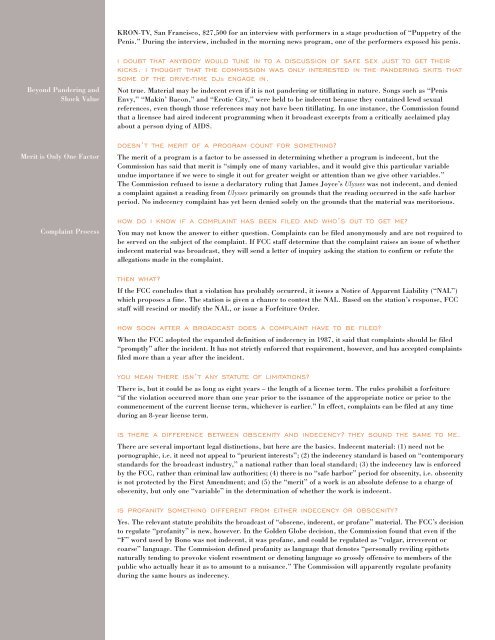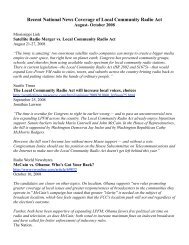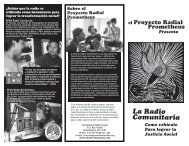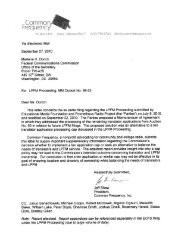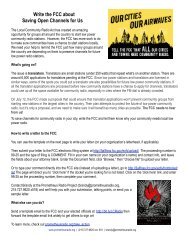WSCA Station Handbook and Training Manual - Prometheus Radio ...
WSCA Station Handbook and Training Manual - Prometheus Radio ...
WSCA Station Handbook and Training Manual - Prometheus Radio ...
You also want an ePaper? Increase the reach of your titles
YUMPU automatically turns print PDFs into web optimized ePapers that Google loves.
KRON-TV, San Francisco, $27,500 for an interview with performers in a stage production of “Puppetry of the<br />
Penis.” During the interview, included in the morning news program, one of the performers exposed his penis.<br />
Beyond P<strong>and</strong>ering <strong>and</strong><br />
Shock Value<br />
Merit is Only One Factor<br />
Complaint Process<br />
I DOUBT THAT ANYBODY WOULD TUNE IN TO A DISCUSSION OF SAFE SEX JUST TO GET THEIR<br />
KICKS. I THOUGHT THAT THE COMMISSION WAS ONLY INTERESTED IN THE PANDERING SKITS THAT<br />
SOME OF THE DRIVE-TIME DJS ENGAGE IN.<br />
Not true. Material may be indecent even if it is not p<strong>and</strong>ering or titillating in nature. Songs such as “Penis<br />
Envy,” “Makin’ Bacon,” <strong>and</strong> “Erotic City,” were held to be indecent because they contained lewd sexual<br />
references, even though those references may not have been titillating. In one instance, the Commission found<br />
that a licensee had aired indecent programming when it broadcast excerpts from a critically acclaimed play<br />
about a person dying of AIDS.<br />
DOESN’T THE MERIT OF A PROGRAM COUNT FOR SOMETHING?<br />
The merit of a program is a factor to be assessed in determining whether a program is indecent, but the<br />
Commission has said that merit is “simply one of many variables, <strong>and</strong> it would give this particular variable<br />
undue importance if we were to single it out for greater weight or attention than we give other variables.”<br />
The Commission refused to issue a declaratory ruling that James Joyce’s Ulysses was not indecent, <strong>and</strong> denied<br />
a complaint against a reading from Ulysses primarily on grounds that the reading occurred in the safe harbor<br />
period. No indecency complaint has yet been denied solely on the grounds that the material was meritorious.<br />
HOW DO I KNOW IF A COMPLAINT HAS BEEN FILED AND WHO’S OUT TO GET ME?<br />
You may not know the answer to either question. Complaints can be filed anonymously <strong>and</strong> are not required to<br />
be served on the subject of the complaint. If FCC staff determine that the complaint raises an issue of whether<br />
indecent material was broadcast, they will send a letter of inquiry asking the station to confirm or refute the<br />
allegations made in the complaint.<br />
THEN WHAT?<br />
If the FCC concludes that a violation has probably occurred, it issues a Notice of Apparent Liability (“NAL”)<br />
which proposes a fine. The station is given a chance to contest the NAL. Based on the station’s response, FCC<br />
staff will rescind or modify the NAL, or issue a Forfeiture Order.<br />
HOW SOON AFTER A BROADCAST DOES A COMPLAINT HAVE TO BE FILED?<br />
When the FCC adopted the exp<strong>and</strong>ed definition of indecency in 1987, it said that complaints should be filed<br />
“promptly” after the incident. It has not strictly enforced that requirement, however, <strong>and</strong> has accepted complaints<br />
filed more than a year after the incident.<br />
YOU MEAN THERE ISN’T ANY STATUTE OF LIMITATIONS?<br />
There is, but it could be as long as eight years – the length of a license term. The rules prohibit a forfeiture<br />
“if the violation occurred more than one year prior to the issuance of the appropriate notice or prior to the<br />
commencement of the current license term, whichever is earlier.” In effect, complaints can be filed at any time<br />
during an 8-year license term.<br />
IS THERE A DIFFERENCE BETWEEN OBSCENITY AND INDECENCY? THEY SOUND THE SAME TO ME.<br />
There are several important legal distinctions, but here are the basics. Indecent material: (1) need not be<br />
pornographic, i.e. it need not appeal to “prurient interests”; (2) the indecency st<strong>and</strong>ard is based on “contemporary<br />
st<strong>and</strong>ards for the broadcast industry,” a national rather than local st<strong>and</strong>ard; (3) the indecency law is enforced<br />
by the FCC, rather than criminal law authorities; (4) there is no “safe harbor” period for obscenity, i.e. obscenity<br />
is not protected by the First Amendment; <strong>and</strong> (5) the “merit” of a work is an absolute defense to a charge of<br />
obscenity, but only one “variable” in the determination of whether the work is indecent.<br />
IS PROFANITY SOMETHING DIFFERENT FROM EITHER INDECENCY OR OBSCENITY?<br />
Yes. The relevant statute prohibits the broadcast of “obscene, indecent, or profane” material. The FCC’s decision<br />
to regulate “profanity” is new, however. In the Golden Globe decision, the Commission found that even if the<br />
“F” word used by Bono was not indecent, it was profane, <strong>and</strong> could be regulated as “vulgar, irreverent or<br />
coarse” language. The Commission defined profanity as language that denotes “personally reviling epithets<br />
naturally tending to provoke violent resentment or denoting language so grossly offensive to members of the<br />
public who actually hear it as to amount to a nuisance.” The Commission will apparently regulate profanity<br />
during the same hours as indecency.


